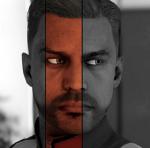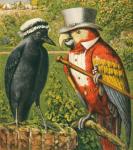 worry, on 10 May 2016 - 10:23 PM, said:
worry, on 10 May 2016 - 10:23 PM, said:
@Loki: If you don't mind one more question, what is reading (fiction, non-fiction, the board, whatever) like for you?
I've been trying to figure out how to answer this for hours.

It's definitely easier for me to read something than to write or describe something.
The first time I read a fiction book it involves a lot of individual construction. I have to compartmentalise individual aspects (individual characters, environments, individual aspects of an environment, etc) and construct them all individually before combining them together to form the scene. So the first time a character is introduced I have to remove them from the rest of the scene and then develop them as I learn more about them until they retrospectively get put back (this isn't making much sense

). I then use that initial construct in all further interactions occasionally updating as necessary. The less descriptive words and the less emotion based words an author uses the easier it for me to read (in fact, there is a point where I just can't read a book if it has too many feeling or descriptive words). It's why I love Erikson. He writes pragmatically which makes it easier for me. But that said, my constructs aren't always correct because there are fundamental connections I make differently. For instance, I usually don't know what colour a characters skin is unless it's been described using racial terms ie African American or the word to describe the colour of their skin isn't a colour that is associated with concepts. For instance, I only realised that Quick Ben had black skin when I saw the artwork for the Subpress GotM. Shiara had to explain to me that the picture was correct. I had constructed him as black but not as black skinned - his essence was black but I never made the connection of 'dark' and 'black' to be literal. Black almost never translates as a colour. So, as I read an every forming, changing image is created but probably not like you would make. When you think of Quick Ben you might imagine a man. What I see is black swirls against a black background and several swirling pools of ash. That's Quick Ben. Do you know how the eqyptians would enclose names in a circle? When I imagine Quick Ben in relation to other things or in a certain place I do that. (I have attached a terrible paint rendition of Quick Ben standing next to a tree). However, I can take my Quick Ben and translate him into a more recognisable human form but I do that by finding a similar already existing character in a movie and then say 'Quick Ben looks like them, sorta' but it's again based on not their appearance but their presence. In fact, I very rarely associate anything by appearance or looks. It's always based on presence which is why I sometimes say two people look alike and then Matador will point out that one is an asian male with black hair and the other is a white woman with blonde hair.

The more times I read a book the easier it is. I tend to find rereads more enjoyable because there is less mental exhaustion involved. It's very common for me to have to read out a sentence to Matador that just makes no sense to me whatsoever. They usual have to do with abstract concepts or an expectation on the part of the author that what they are referring to is a universal truth that is understood by everyone. I also fail very badly at recognising and/or understanding double entendres, euphemisms, etc. I also hate subtext with a passion.
Non-fiction depends on the subject. If it is just factual and 'a + b = c' then I imagine it's the same as most people (it just auto translate into thoughts). But if it also discusses the philosophical aspects or involves social narrative etc then it becomes more difficult.
I really like reading but I don't read a lot because there aren't many authors who write in a way that works well for me. But when I do find one I stick to them. Poetry is usually a nightmare for me but Poe, Tennyson, and Banjo Patterson manage to make sense to me and the abstract things they refer to, they do it in a way that matches my own thinking (at least far more than other writers), so I absolutely love reading them. Lovecraft (which I only read recently) also has a brilliant way of describing the unnameable that is actually easy for me to connect with too. In fact, most of the stories I enjoy or have an easier time of reading are from older writers, like Verne, because they were more of a scientific mind than an artistic one, if you know what I mean.
I think the reason I enjoy comics so much is that most of the story is told in pictures.
I don't know if that really gives you an idea or not.

 Andorion, on 11 May 2016 - 02:52 PM, said:
Andorion, on 11 May 2016 - 02:52 PM, said: Tiste Simeon, on 11 May 2016 - 07:07 AM, said:
Tiste Simeon, on 11 May 2016 - 07:07 AM, said: Puck, on 10 May 2016 - 10:17 PM, said:
Puck, on 10 May 2016 - 10:17 PM, said:
 Help
Help























